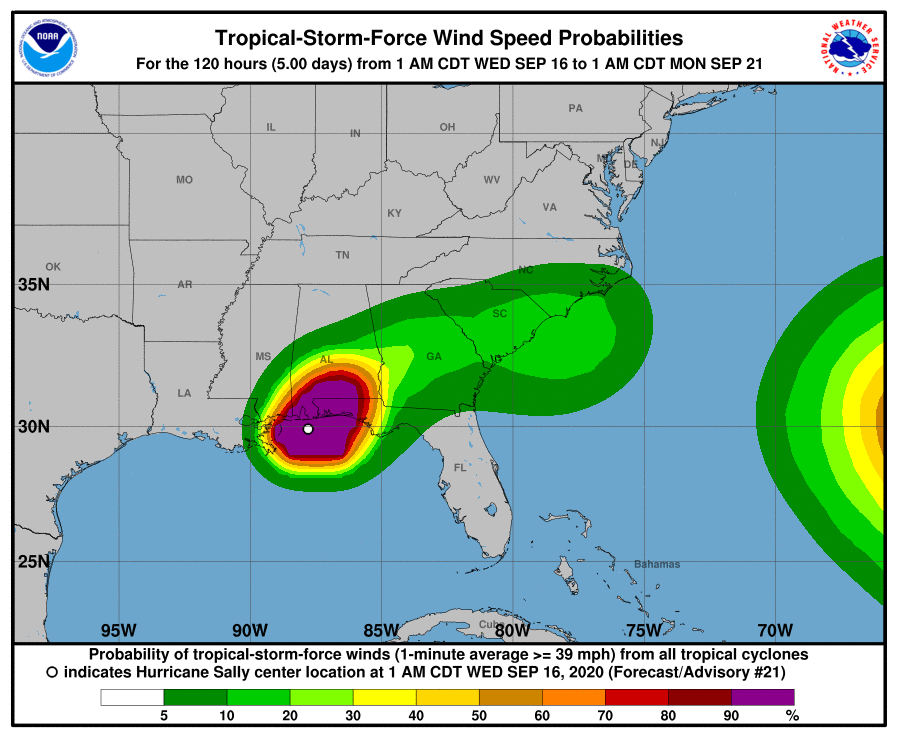For LIVE stream camera coverage across Mississippi and Flora-Bama click here
BULLETIN Hurricane Sally Advisory Number 22 NWS National Hurricane Center Miami FL AL192020 1000 AM CDT Wed Sep 16 2020 ...CATASTROPHIC AND LIFE-THREATENING FLOODING OCCURRING OVER PORTIONS OF THE FLORIDA PANHANDLE AND SOUTHERN ALABAMA... SUMMARY OF 1000 AM CDT...1500 UTC...INFORMATION ----------------------------------------------- LOCATION...30.6N 87.4W ABOUT 15 MI...20 KM WNW OF PENSACOLA FLORIDA MAXIMUM SUSTAINED WINDS...80 MPH...130 KM/H PRESENT MOVEMENT...NNE OR 30 DEGREES AT 5 MPH...7 KM/H MINIMUM CENTRAL PRESSURE...975 MB...28.79 INCHES WATCHES AND WARNINGS -------------------- CHANGES WITH THIS ADVISORY: The Tropical Storm Warning has been discontinued west of the Mississippi/Alabama border. SUMMARY OF WATCHES AND WARNINGS IN EFFECT: A Storm Surge Warning is in effect for... * Dauphin Island Alabama to the Walton/Bay County Line Florida A Hurricane Warning is in effect for... * Mississippi/Alabama border to the Okaloosa/Walton County line Florida A Tropical Storm Warning is in effect for... * East of the Okaloosa/Walton County line Florida to Indian Pass Florida A Storm Surge Warning means there is a danger of life-threatening inundation, from rising water moving inland from the coastline in the indicated locations. For a depiction of areas at risk, please see the National Weather Service Storm Surge Watch/Warning Graphic, available at hurricanes.gov. This is a life-threatening situation. A Hurricane Warning means that hurricane conditions are occurring somewhere within the warning area. A Tropical Storm Warning means that tropical storm conditions are occurring within the warning area. For storm information specific to your area, including possible inland watches and warnings, please monitor products issued by your local National Weather Service forecast office. DISCUSSION AND OUTLOOK ---------------------- At 1000 AM CDT (1500 UTC), the center of Hurricane Sally was located by NWS Doppler radar and surface observations near latitude 30.6 North, longitude 87.4 West. Sally is moving toward the north- northeast near 5 mph (7 km/h), and a north-northeastward to northeastward motion at a slightly faster forward speed is expected later today and tonight. A faster northeastward motion is forecast Thursday and Thursday night. On the forecast track, the center of Sally will move across the extreme western Florida panhandle and southeastern Alabama through early Thursday, move over central Georgia on Thursday, and move over South Carolina Thursday night. Maximum sustained winds have decreased to near 80 mph (130 km/h) with higher gusts. Additional weakening is expected as the center moves farther inland this afternoon and tonight, and Sally is forecast to become a tropical depression by Thursday morning. Hurricane-force winds extend outward up to 35 miles (55 km) from the center and tropical-storm-force winds extend outward up to 125 miles (205 km). A wind gust of 82 mph (135 km/h) was recently observed at the Pensacola Naval Air Station, in Pensacola, Florida. A wind gust of 68 mph (110 km/h) was recently reported at the Mobile Downtown Airport, in Mobile, Alabama. The estimated minimum central pressure based on surface observations is 975 mb (28.79 inches). HAZARDS AFFECTING LAND ---------------------- Key messages for Sally can be found in the Tropical Cyclone Discussion under AWIPS header MIATCDAT4 and WMO header WTNT44 KNHC, and on the web at www.hurricanes.gov/text/MIATCDAT4.shtml RAINFALL: Through this afternoon, Sally will produce additional rainfall totals of 8 to 12 inches with localized higher amounts possible along and just inland of the central Gulf Coast from west of Tallahassee, Florida to Mobile Bay, Alabama. Storm totals of 10 to 20 inches to isolated amounts of 35 inches are expected. Historic and catastrophic flooding, including widespread moderate to major river flooding, is unfolding. Sally will track across the Southeast through Friday, producing the following rainfall totals: Central Alabama to central Georgia: 4 to 8 inches, with isolated amounts of 12 inches. Significant flash and urban flooding is likely, as well as widespread minor to moderate flooding on some rivers. Western South Carolina into western and central North Carolina: 4 to 6 inches, with isolated amounts of 9 inches. Widespread flash and urban flooding is possible, as well as minor to moderate river flooding. Southeast Virginia: 2 to 5 inches, with isolated amounts of 7 inches. Scattered flash and urban flooding is possible, as well as scattered minor river flooding. STORM SURGE: The combination of a dangerous storm surge and the tide will cause normally dry areas near the coast to be flooded by rising waters moving inland from the shoreline. The water could reach the following heights above ground somewhere in the indicated areas if the peak surge occurs at the time of high tide... AL/FL Border to Okaloosa/Walton County Line, FL including Pensacola Bay and Choctawhatchee Bay...4-7 ft Okaloosa/Walton County Line, FL to Walton/Bay County Line, FL...2-4 ft Dauphin Island, AL to AL/FL Border including Bon Secour Bay...2-4 ft Walton/Bay County Line, FL to Chassahowitzka, FL including Saint Andrew Bay...1-3 ft The deepest water will occur along the immediate coast in areas of onshore winds, where the surge will be accompanied by large and damaging waves. Surge-related flooding depends on the relative timing of the surge and the tidal cycle, and can vary greatly over short distances. For information specific to your area, please see products issued by your local National Weather Service forecast office. WIND: Hurricane conditions will continue this afternoon within portions of the hurricane warning area in Florida and Alabama. Tropical storm conditions will continue in portions of the warning areas through tonight. TORNADOES: A few tornadoes may occur today and tonight across portions of the Florida Panhandle, southeast Alabama, and southwest Georgia. SURF: Swells from Sally will continue to affect the Gulf Coast from the Florida Big Bend westward to southeastern Louisiana during the next day or so. These swells are likely to cause life- threatening surf and rip current conditions. Please consult products from your local weather office.





